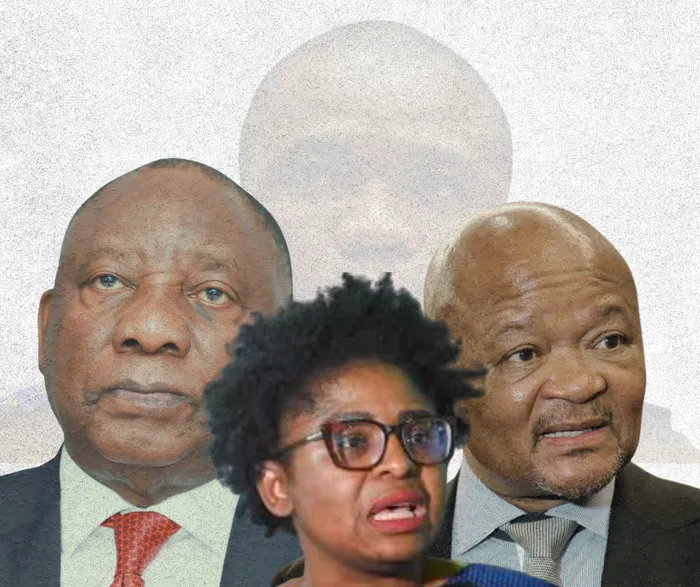
South Africa faces a critical juncture as unimplemented findings from state commissions raise alarms about the integrity of its security institutions. With recent accusations of corruption and potential political instability, the nation must confront its challenges head-on.
Image: IOL Graphics
South Africa finds itself at a perilous crossroads, with recent revelations casting doubt on the integrity of the nation’s security institutions. A series of state commissions, established over the years to investigate scandals and security lapses, have painted a troubling picture: a ticking time bomb poised to destabilise the country further.
Since the dawn of democracy, South Africa’s parliamentary and judicial commissions have played a critical role in addressing public controversies. Yet, many of their findings remain unimplemented, raising questions about political will and institutional commitment to reform.
Last week, in a shocking media briefing, KwaZulu-Natal’s top police official, Lieutenant Nhlanhla Mkhwanazi, accused Police Minister Senzo Mchunu of being part of a criminal syndicate actively undermining efforts to combat crime.
Mkhwanazi’s allegations come amid persistent concerns over policing deficiencies, illegal border crossings, unchecked immigration, and organised crime-issues that threaten national security.
This week in Cape Town, Minister in the Presidency Khumbudzo Ntshavheni unveiled a redacted version of the country’s National Security Strategy (NSS) and National Intelligence Estimate (NIE) documents for the current administration.
She warned of “one of the risks” being a potential coup d’état, asserting that measures are in place to mitigate such threats.
“The government has identified the risk of a coup d’état and taken steps to prevent it,” Ntshavheni declared. “We have men and women in our defence and police services working tirelessly for the greater good of this country.”
However, critics argue that these reassurances mask deeper systemic issues. Several commissions have previously highlighted alarming deficiencies within South Africa’s security sector.
The Mufamadi Commission, officially known as the High-Level Review Panel on the State Security Agency, revealed a disturbing trend in the intelligence community: It has shifted towards a narrow, politically motivated security focus, diverging from constitutional principles.
The panel recommended overhauling the intelligence framework, citing political malpractices, factionalism, and disregard for legal mandates.
Similarly, the Farlam Commission, established after the Marikana massacre, recommended reforms in police crowd management, public order policing, and accountability measures. Yet, years later, many of these recommendations remain unimplemented.
Dr Mpumelelo Breakfast, a political analyst, emphasised the importance of acting on these findings.
“If these recommendations had been implemented, they could have served as effective deterrents against corruption and insecurity,” he said.
“The public must stay vigilant and demand oversight to protect our resources and ensure accountability.”
From a legal standpoint, commissions serve as vital platforms for issue ventilation beyond the scope of courts.
Political analyst Dr Reneva Fourie stated, “Commissions provide a broader remit than courts, allowing for purpose-built investigations. They are against political interference, especially for institutions like the National Prosecuting Authority.”
However, Fourie cautioned that evidence gathered through commissions does not automatically become admissible in court, often requiring further judicial processes.
She stressed their role in laying the groundwork for law enforcement investigations.
A report published by the South African Institute of International Affairs (SAIIA) in May 2024 echoed these sentiments, highlighting the quasi-judicial nature of commissions and their importance in safeguarding the rule of law amid political turbulence.
On Thursday, the Walter and Albertina Sisulu Foundation sharply criticised Ntshavheni’s recent remarks about coup risks, calling her statements “deeply irresponsible and reckless.”
The Foundation accused her of fear-mongering, especially in the context of President Cyril Ramaphosa’s recent actions, including placing Minister Mchunu on leave amid allegations of political interference.
“Such claims without evidence are dangerous,” the Foundation stated.
“They exacerbate political tensions and threaten national stability.”
As South Africa grapples with these complex security challenges, Fourie warned, “Without decisive reform and genuine oversight, South Africa’s security institutions risk becoming instruments of division rather than protection. The country’s future depends on it.”
thabo.makwakwa@inl.co.za
IOL Politics
Related Topics: